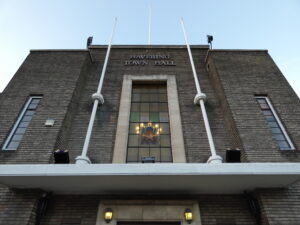
Havering Town Hall. Image: LDRS
(Written by Local Democracy Reporter, Sebastian Mann)
The cash-strapped town hall will raise the levy by 4.99% – the highest it can go without a public referendum.
For the average Band-D resident in the borough, that will mean an extra £9 in their monthly bills.
The borough saw similar tax rises last year as the council struggled to balance its budget.
Council leader Ray Morgon said: “Despite constant lobbying and meetings with government ministers and civil servants, we have not been given the support we need to bridge the gap from last year.”
He continued: “Over the years, we have seen a substantial reduction in government funding and, sadly, it has been local residents who have had to make up a large part of the deficit.
“This has led to us seeing the fifth highest council tax in London. This is not fair nor sustainable.”
After a challenging year, Havering Council will be entering the 2025/26 financial year with a budget deficit of around £71million, revised from £75m. That is more than double last year’s shortfall of £35m.
Last February, the town hall was saved from effective bankruptcy by a £32.5m bailout from the central government.
Cllr Morgon said the council once again “had no choice but to apply for another government loan,” this time of £71m.
In December, Havering was allocated £40m in funding as part of a nationwide settlement for councils. That constituted a £10m increase overall from last year, but the leadership says it simply won’t be enough.
Cllr Morgon said the round of funding “failed to help those councils most in financial need,” despite “all the earlier rhetoric about doing so”.
The town hall is also set to increase its rents for tenants by 2.7%, and its fees and charges will go up by 2.7%.
The council says it consulted 600 residents and just over half said they would pay 5% or more in council tax. Around 41% said they do not want to see an increase.
“It is either that or a massive increase in council tax,” he said.
He added that the town hall “won’t grind to a standstill”. He said: “Services will continue for residents despite the budget gap. Staff and bills will still be paid.”
On top of hiking council tax, the town hall has explored a series of controversial money-saving measures.
Last year, councillors proposed closing four of the borough’s seven libraries to cut down on operating costs. The centres – spread across Collier Row, Elm Park, Gidea Park, and Harold Wood – are expected to be formally shuttered at a cabinet meeting next week.
It is anticipated it will save the council around £300,000 a year.
Councillors have also approved schemes to convert six ‘underused’ car parks across Romford and Hornchurch into housing. Though residents oppose them, plans are being drawn up for new tower blocks, which the council hopes will take the pressure off its housing department.
Last year, the town hall overspent its housing budget by £7.1m by paying to house at-risk families in hotels and bed-and-breakfast-style temporary accommodation.
It also hopes to take the strain off its children’s social care sector by using new AI tools that it says will better manage social workers’ case loads. Demographic changes in recent years have led to a boom in the young population, which the council has struggled to accommodate financially.
The new council tax scheme will go before the cabinet for approval next week. It will then be given the final stamp at a special council meeting at the end of the month.
Categories: Council tax
Locations:
Authorities: Havering Council